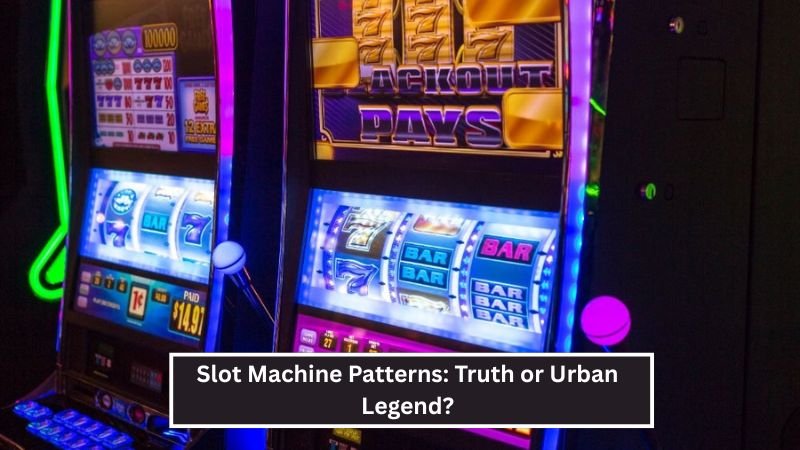
Slot machines are among the most popular attractions in any casino, from the dazzling floors of Las Vegas to online gaming platforms accessed by millions daily. With their flashing lights, spinning reels, and the promise of life-changing jackpots, it’s no surprise that players have spent decades trying to decode their mysteries. One of the most enduring debates in the gambling world is whether slot machine patterns actually exist, or if the idea is just an urban legend created by hopeful players and casino folklore.
So, is there any truth to the concept of predictable slot machine patterns? Or are these beliefs nothing more than myths? Let’s dive into the world of slots, random number generators, and player psychology to uncover the facts.
Understanding How Slot Machines Work
The Basics of Slot Mechanics
Before diving into the concept of patterns, it’s crucial to understand how slot machines operate. In the past, classic mechanical slots relied on gears, springs, and physical reels. Wins were determined by the alignment of symbols when the reels stopped spinning. While mechanical slots had limitations in the number of possible outcomes, today’s digital and online slots use advanced technology.
The Role of Random Number Generators (RNG)
Modern slot machines use a computer program called a Random Number Generator (RNG). The RNG is responsible for continuously generating thousands of number combinations every second, even when the machine isn’t being played. The moment a player hits the spin button, the RNG picks the most recent number combination, which determines the position of the reels and the outcome.
This system ensures that each spin is entirely independent of the one before or after. There is no memory, no streak-building logic, and no way for players to predict or influence the outcome—at least not legally or realistically.
The Origin of Slot Machine Pattern Theories
Despite the overwhelming role of randomness, the belief in slot patterns persists. But where did these ideas come from?
Historical Influences
In older mechanical machines, players sometimes observed patterns due to mechanical wear or poor maintenance. For example, some symbols might land more frequently due to a misaligned reel. While rare, these anomalies fed into the belief that slots could be “cracked.”
The Gambler’s Fallacy
Another key driver behind these myths is the gambler’s fallacy—the mistaken belief that past events can influence future outcomes in random systems. For example, a player might think, “The machine hasn’t paid out in a while, so it’s due for a win.” In reality, RNG systems make every spin statistically independent, meaning the past has zero impact on the future.
Common Myths and Patterns Believed by Players
Let’s examine some of the most common slot machine pattern theories and whether they hold any truth.
1. The “Hot and Cold” Machine Theory
Myth: Some machines are “hot” and are more likely to pay out, while others are “cold” and should be avoided.
Truth: This theory has no basis in how slot machines work. Since spins are independent and controlled by RNG, a machine is never “due” for a win. Casinos also don’t adjust machines mid-session to become tighter or looser—this would require a reset of the machine, often under regulation and surveillance.
2. Timing the Spin for a Win
Myth: Pressing the spin button at just the right time will result in a win.
Truth: While it’s technically true that the exact millisecond you press the button determines the outcome (since the RNG is constantly running), there’s no human way to time it perfectly. The speed at which the RNG generates numbers far exceeds human reflexes, making this approach unfeasible.
3. Watching for Symbol Patterns
Myth: Players sometimes believe they can recognize patterns in symbol sequences and use that knowledge to predict outcomes.
Truth: Slots are designed to create the illusion of patterns, but they are nothing more than a product of randomization. Clusters of similar outcomes might seem meaningful, but they are purely coincidental.
4. Winning After a Big Loss
Myth: A long losing streak means a big win is coming soon.
Truth: This is another example of the gambler’s fallacy. Losing streaks do not increase your chances of winning. Each spin is a separate event with the same odds, no matter what happened before.
Are There Any Legitimate Strategies?
While you can’t beat the RNG or predict outcomes, there are still smart ways to approach slot play.
1. Bankroll Management
The most important strategy for any gambler is knowing how to manage their money. Set win and loss limits, and stick to them. This keeps gambling fun and prevents significant losses.
2. Choose the Right Machines
Not all slots are created equal. Some offer higher Return to Player (RTP) percentages than others. RTP is the theoretical percentage of wagered money a slot will return to players over time. Choosing games with higher RTP gives you a slightly better long-term chance.
3. Look for Bonuses and Promotions
Many online casinos offer free spins, deposit bonuses, and loyalty programs. These can stretch your bankroll and increase playtime without extra spending.
Why Slot Patterns Feel Real
Despite the evidence, many people continue to believe in patterns. This is largely due to how our brains work.
Pattern Recognition and Psychology
Humans are naturally inclined to look for patterns—it’s part of how we process information. When a player sees similar outcomes or repeated losses, their brain tries to find a cause or pattern, even when one doesn’t exist.
The Role of Near Misses
Slot machines are designed to simulate near-misses, like seeing two jackpot symbols land on the first two reels and then a losing symbol on the third. These near-wins trigger the brain’s reward center, making the experience more exciting and encouraging players to keep spinning.
Entertainment Factor
Casinos benefit from these psychological effects. The more entertained and hopeful a player feels, the longer they play. The illusion of patterns, even if false, plays into that.
What About Pattern-Hacking Software?
There are countless apps and websites claiming to offer slot prediction software or RNG analyzers. Almost all of these are scams or outright illegal.
Legal and Ethical Risks
Tampering with slot machines or using software to cheat is illegal in almost every jurisdiction. Casinos use advanced surveillance and AI-driven anti-cheating software to detect irregularities.
Even if such methods worked (which they don’t), the legal consequences far outweigh any possible gains.
Online Slots vs Land-Based Slots: Any Differences?
Similarities
Both land-based and online slots use RNGs, so the randomness principle holds in both settings. Neither offers a higher chance of discovering patterns.
Differences
- Online slots tend to have higher RTPs.
- Land-based casinos may use bonuses and comps to retain players.
- Online platforms may add extra features like mini-games and bonus rounds to enhance excitement.
Still, in both environments, no pattern-based strategy will increase your odds.
Final Verdict: Truth or Urban Legend?
The idea that you can crack the code and discover slot machine patterns is, for the most part, an urban legend. While human psychology makes these patterns seem real, the reality is that slot machines—both physical and online—are designed to be completely random, fair (within regulated parameters), and impossible to predict.
There’s no secret formula, no timing trick, and no pattern that guarantees a win. What you can do is gamble responsibly, choose games with higher RTPs, and view slot machines as a form of entertainment, not a path to riches.
Conclusion
Slot machine patterns are a myth fueled by a mix of outdated mechanics, cognitive biases, and our natural tendency to find meaning in randomness. While slots are exciting and immersive, they should always be played for fun, not as a financial strategy.
Understanding how they work—especially the role of RNGs—can help players make informed choices and avoid falling for false strategies or scams. The best way to win? Enjoy the game, play smart, and know when to walk away.






